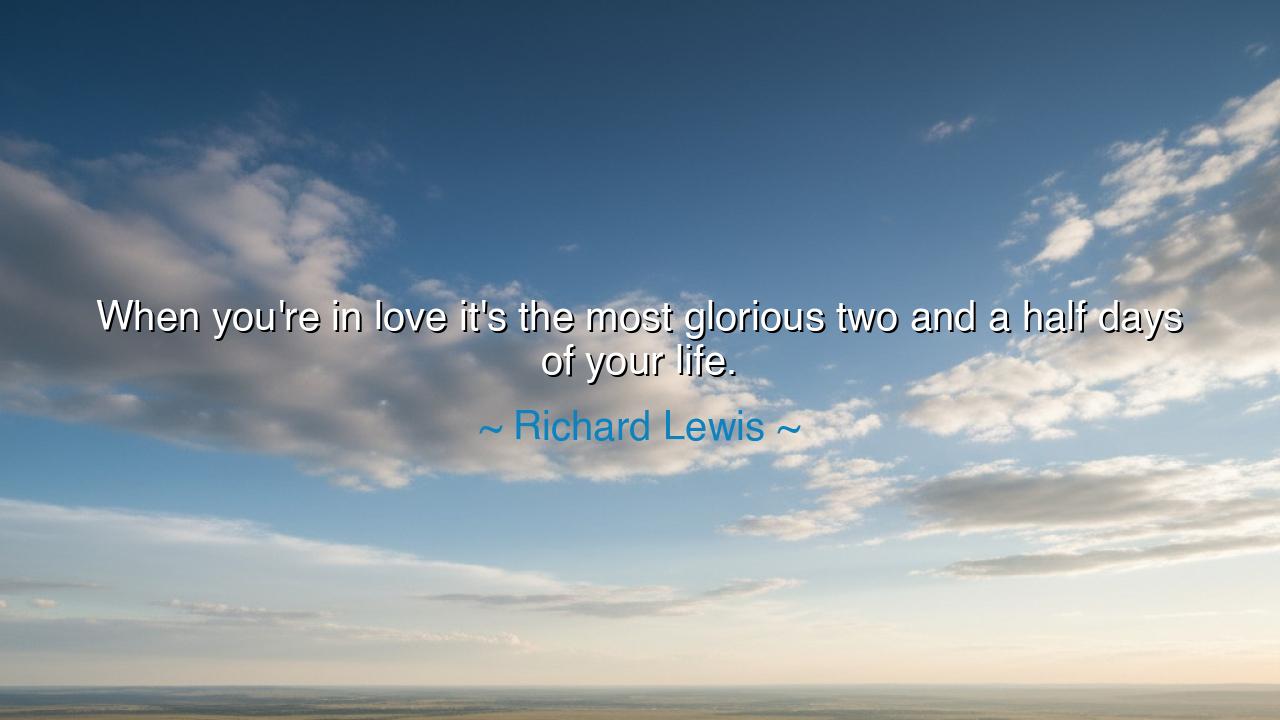
When you're in love it's the most glorious two and a half days of






In the vast tapestry of human experience, love holds a place of reverence that transcends time and culture. It is the fire that lights the soul, the balm that heals wounds, and the force that compels men and women to transcend their limits. Yet, as Richard Lewis so succinctly captures, "When you're in love, it's the most glorious two and a half days of your life." In this seemingly simple statement, he speaks not only to the fleeting nature of passion but to the deep intensity that love imbues in our very being. Love—in its early, untainted stages—takes us to a place of euphoria, where time seems to bend and our every moment feels like eternity. But, as the seasons change, so too does this intense joy, often fading as quickly as it arrived.
The very nature of love is such that it cannot be bound to the mundane march of time. It exists in a heightened state, where every glance, every word spoken, every touch feels as though it could alter the course of the universe. The two and a half days Lewis mentions is a metaphor—a reflection of love's often brief but profoundly impactful presence in our lives. It is not to say that love cannot endure, but rather that the first flush of love—the one that consumes you—is transient, a fire that burns brightly but burns hot. This feeling, so raw and vibrant, takes us into the realm of mythic passion, where nothing else seems to matter, and the world is brighter, richer, and more alive.
Consider the story of Cleopatra and Julius Caesar, two figures whose love was as intense as it was fleeting. When Caesar, the mighty Roman leader, fell for the Egyptian queen, the world seemed to stop for them. Their passion was not just personal—it was political, world-changing. Yet, like all things in the world of humans, it was not destined to last. Caesar was assassinated, and Cleopatra's reign was eventually brought to a tragic close. In the brief time they shared, however, their love sparked powerful change, not just in their own lives but in the history of nations. It was, indeed, a glorious moment—but a moment nonetheless. Their love was a comet streaking across the sky—brilliant, momentous, and fleeting.
In the realm of the heart, few things compare to the first stirrings of romantic affection. These early days of love are filled with a wild euphoria that defies reason. When we are in love, the world around us fades into insignificance. We see only the object of our affection, and every interaction with them is imbued with deep meaning. Our bodies, our hearts, our minds—every part of us is attuned to the other, as if the very rhythm of the universe has synced with our own. Richard Lewis's quote captures this truth: love, in its purest form, is a brief, intense blaze—a fire that lights up our existence and warms us through.
Yet, the nature of love is not simply to be experienced; it must also be understood. The glorious days Lewis refers to are not eternal, but their significance is profound. To love is to be vulnerable, to open oneself up to another in ways that we might never have imagined possible. The intensity of love is the greatest gift and the greatest challenge. It is a reminder of the fragility of human connection—how even the most perfect union is at the mercy of time, of circumstance, of fate. This is where the wisdom of the ancients teaches us an important lesson. Love is not just an emotion, but a force—a powerful force that shapes us, that molds us, and that challenges us to grow.
But there is, within this impermanence, a great lesson for all of us. To love fully and with abandon, knowing that it is temporary, is to embrace the present moment. It is to hold fast to the beauty of what is now, without lamenting the inevitable passing of time. The lesson is not in the duration of love, but in the depth of its feeling. In this brief moment, we are reminded of the essence of humanity—our capacity for connection, for passion, and for joy. To love is to live fully, to experience life at its most vivid and real. And even when those two and a half days have passed, the echoes of that love will continue to resonate within us, shaping who we are and who we become.
So, let us take from this brief yet powerful reflection the wisdom of love’s transience. Do not wait for the perfect moment to love—love now, with all your heart. Be present, knowing that the glory of love is in the giving, not in its lasting. Love, with all its beauty and imperfection, is the greatest gift we can offer to the world. And as we do, we honor not only the other person, but the fleeting, miraculous nature of existence itself.






AAdministratorAdministrator
Welcome, honored guests. Please leave a comment, we will respond soon